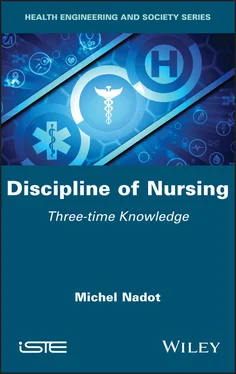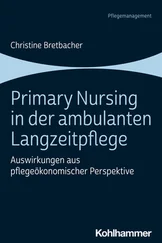Michel Nadot - Discipline of Nursing
Здесь есть возможность читать онлайн «Michel Nadot - Discipline of Nursing» — ознакомительный отрывок электронной книги совершенно бесплатно, а после прочтения отрывка купить полную версию. В некоторых случаях можно слушать аудио, скачать через торрент в формате fb2 и присутствует краткое содержание. Жанр: unrecognised, на английском языке. Описание произведения, (предисловие) а так же отзывы посетителей доступны на портале библиотеки ЛибКат.
- Название:Discipline of Nursing
- Автор:
- Жанр:
- Год:неизвестен
- ISBN:нет данных
- Рейтинг книги:5 / 5. Голосов: 1
-
Избранное:Добавить в избранное
- Отзывы:
-
Ваша оценка:
- 100
- 1
- 2
- 3
- 4
- 5
Discipline of Nursing: краткое содержание, описание и аннотация
Предлагаем к чтению аннотацию, описание, краткое содержание или предисловие (зависит от того, что написал сам автор книги «Discipline of Nursing»). Если вы не нашли необходимую информацию о книге — напишите в комментариях, мы постараемся отыскать её.
Discipline of Nursing — читать онлайн ознакомительный отрывок
Ниже представлен текст книги, разбитый по страницам. Система сохранения места последней прочитанной страницы, позволяет с удобством читать онлайн бесплатно книгу «Discipline of Nursing», без необходимости каждый раз заново искать на чём Вы остановились. Поставьте закладку, и сможете в любой момент перейти на страницу, на которой закончили чтение.
Интервал:
Закладка:
The history of nursing knowledge has little to do with the history of religion or the history of medicine. Rather, it would be the history of the organization of collective households, of the way they are run and how they function that is at issue. This history is simply concomitant with the history of hospitals (that of the house, the household, the Domus , the hospital). These hospital establishments are then the first spaces of speech devoted to hospitality. They are the first spaces for “discursive events” [FOU 69] to take institutional care of it or for the specialization of hospital domestic work.
1 1The school was closed in 1995.
2 2 The Ancien Régime in France was its political and social system from the Late Middle Ages until the French Revolution of 1789, which led to the abolition of hereditary monarchy and the feudal system of nobility.
3 3Collière seems to be speaking here more to history teachers in nursing schools than to the nurses themselves. In fact, most of the instructors of yesteryear (now educators) who taught the history of the profession in nursing schools and institutes in France, for example, were not, in general, researchers in history.
4 4We sometimes speak of inter-trade or inter-professionality.
2
The Hospital as a Place to Talk
It is at the time when the hospital was built and organized that the traditions of language of the care discipline began to emerge and thus find their singularity. Symbols of the central power of the urban bourgeoisie in the legal sense, some of these hospital buildings underwent successive major architectural changes or were rebuilt (more beautiful and larger than before) 1 . In this particular space and time, of prime importance in determining the place of emergence of what would later become the nursing discipline and its knowledge, stood a language of a welcoming nature, a form of life support and protection of human beings similar to that held by an ordinary housewife or mother looking after the home, her spouse, children, parents and other relatives.
NOTE.– Here, it is important to distinguish between the different places of care and not to mix everything together. We can have a space in which a religious language is shaped by the values of the hierarchy of the Church, sacred or doctrinal texts (practical charity of the Church, alms, hospitality, works of mercy, etc.). These religious spaces were first created in Catholic regions and then in Protestant regions. There are also public secular spaces whose organization and functioning sometimes differ from those of the Hôtel-Dieu (the French municipal or communal hospital, often dependent on the bourgeois fiefdom) built by the patricians of a city.
2.1. The origin of the hospital
Rather, the public hospital was an institution of reception and assistance to life that provided a practical economic and material benefit to those who worked there. At the same time, by offering hospitality to the poor, the hospital could in return expect from them work in the service of the prosperity of the hospital’s land holdings. The era of feudalism based on land ownership and serfdom was not far off the mark: the bourgeoisie made its appearance. Thus, at the hôpital de Fribourg (Freiburg hospital), founded between 1248 and 1252, the hospital keeper “was assisted in his task by his wife ( Magistra ), who took care of the housekeeping and directed the female staff of the establishment. The hospital, governed by a layman, was also served by servants and not by religious men or women. This secular and bourgeois character allows us to classify the hospital as a communal or municipal hospital” [NIQ 21]. In comparison, the hôpital de Genève (Geneva hospital) welcomed 135 patients in 1600 [LES 85]. It was establishments of this kind, small (4–12 beds) or large (100–150 beds) that were favored to evoke the emergence of lay nursing knowledge. However, even though only one category of institutions was chosen, it is clear that these institutions could sometimes differ in their management, organization and staffing. “The differences between institutions, even within the same city, are as great as their commonalities. Within the major trends that are shaping the overall hospital landscape in French-speaking Switzerland, for example, each establishment also adopts its own rhythm, depending on local determinations” [DON 03]. We can extend this observation to all the countries concerned by the founding of hospitals. Hospitals therefore present different characteristics in terms of the quality of their services.
The adventure of the so-called “nursing” care began in a fairly limited field of hospital action. At the beginning, the story was mundane and there was nothing medicalized 2 . We owned land or bought a piece of land, if possible close to a river and along communication routes, we began by building, buying or receiving an ordinary house devoted to hospitality in order to welcome passers-by, the poor 3 who were often isolated or without social ties, orphans, the elderly or any wandering person in need of help to live their daily life and we regulated the collective life. A hospital was born! There were “ maisons ” (houses) or “ménages” (households) according to ancient texts.
The terms “ maison ” or “ ménage ” often appeared in the documents (status, job descriptions, accounts, reports) that were created once the house was in operation. There was a need to hire (household) staff to operate it and to offer hospitality. The term “ ménage ” had a special status. The word was often used “as a separate entity with a defined position within the communal structures that were being established and becoming more complex” [ROD 05].
2.2. The care environment
The hospital is an institution that, as a care environment, shapes practices and connects the people who reside there. While this environment transforms its mission, expands or benefits from new equipment, then new knowledge emerges and will be acquired by those who work or live in the hospital. In fact, the hospital environment in a way describes the nature of the background in which care is given. This environment becomes central when the foundations of the discipline and the space and time in which knowledge is created must be rediscovered. “The institution thus shapes the interpretative procedures of situations. Institutions are shaped by models of rationality that they develop reflexively” [DEM 99].
The foundations of the nursing discipline are rooted in hospital space and time. The lay era of the discipline, by linking language to “the only truly scientific concepts that were those related to the geometry of space and time” for Thom, gave meaning to the knowledge in use. The nursing discipline did not grow “above ground”. Hospital spaces allowed the knowledge of care and assistance to life to exist. This knowledge could then be transformed into deeds and words. “Only concepts that can be geometrized and related to space and time are susceptible to universalization and therefore scientificity (…). We know and act only locally” [THO 83]. Hospital space and time as an environment thus determined the first scientific element of the discipline still to be born. With the birth of the hospital, these traditions of language became important for the quality of knowledge and the background of discursive events dear to Foucault in which the nursing discipline could appear. The framework was set. These are the reasons why we place the care environment (the hospital) as the first and central concept that conditions the unique perspective of the so-called “nursing” sciences. For many theorists today, the care environment is also a central concept that characterizes the substance of the nursing discipline [DAL 08a]. Space refers to place, time is what escapes and reminds us of our condition as mortals. These two elements allow us to perceive movement.
Читать дальшеИнтервал:
Закладка:
Похожие книги на «Discipline of Nursing»
Представляем Вашему вниманию похожие книги на «Discipline of Nursing» списком для выбора. Мы отобрали схожую по названию и смыслу литературу в надежде предоставить читателям больше вариантов отыскать новые, интересные, ещё непрочитанные произведения.
Обсуждение, отзывы о книге «Discipline of Nursing» и просто собственные мнения читателей. Оставьте ваши комментарии, напишите, что Вы думаете о произведении, его смысле или главных героях. Укажите что конкретно понравилось, а что нет, и почему Вы так считаете.












